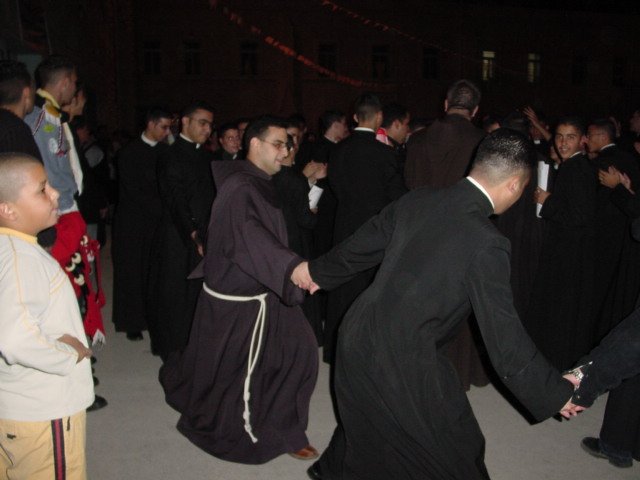November 23, 2003
After breakfast, Elizabeth dashed off to find a taxi to take her to far south Jerusalem, to the offices of B'Tselem, The Israeli Center for Human Rights in the Occupied Territories. Off the tourist track, this area sports very little English language signage - less in fact than even small Palestinian towns. So eventually Elizabeth managed (even using "excuse me," "where," and "thank you," in Hebrew) to find her way to the right door in a huge office complex.
B'Tselem's offices have an extensive resource room, with free copies of all their reports since their inception in 1989. After loading up on useful items, and packing them up in a spare box, Elizabeth walked to a nearby post office to send it off. She took a taxi back to meet Marthame, who had spent the morning picking up the camera (which apparently had needed a good cleaning) and doing resource gathering at the Alternative Information Center and the Israeli Committee Against House Demolitions.
We headed off to meet our colleague and friend Doug in Bethlehem. Luckily for us, the Tantur checkpoint has been open the past couple of days, so we could walk through, with a quick check of our passports. Doug was waiting for us and took us to have pizza (ah, pizza!) and ice cream (ah, ice cream!). Because of its Christian history and remaining Christian population, unlike many towns, Bethlehem has restaurants open during Ramadan.
After a thoroughly enjoyable meal, Doug took us to his friends who are traditional olive wood artisans, where we purchased a nativity set for ourselves and a few other items. These shops are a sad thing. Bethlehem's economic lifeblood is pilgrim and tourist trade, and that has been at an utter standstill for three years. But people have so much invested in their shops, and no other opportunities for work, so they stay on, day after day in quiet streets, hoping for change.
Homam kneels as part of his ordination to the diaconate.
The scouts playing drums and bagpipes as part of the celebration.
Our new friends delivered us at the Latin Seminary in Beit Jala (overlooking Bethlehem). We had come to Jerusalem not only to fix the camera, but more to attend the ordination of our friend Homam, who today becomes a Deacon of the Roman Catholic Church. Homam served last year in Zababdeh as part of his seminary training, and we very much enjoyed getting to know him. We were very glad to be able to be present at this joyful event for him and his family.
After the service, there was a big fiesta in the seminary yard, with scouts on drums and bagpipes, and cheering and dancing seminarians and monks, lifting Homam onto their shoulders. We were also invited to supper afterwards, with family, Seminary clergy and others.
Priests and seminarians join together in a celebratory dance.
We enjoyed a fascinating conversation at our table with a Jesuit priest who converted from Judaism. "No, the Roman Catholic Church has not yet fully come to terms with its complicity in the Holocaust," he said. "However, the problem now is its inability to extricate those issues with issues of how to reach out to the Jewish people and how to address the Israeli-Palestinian conflict."
After a supper, we tucked ourselves into a car in the Patriarch's convoy back to Jerusalem. We rode with two Franciscans, one of whom was among those in the Church of the Nativity during its five week siege in 2002. He talked about how difficult it was physically and emotionally. Was he afraid of the Palestinian gunmen who entered the church? No. Was anyone afraid of them? Yes. "The situation stripped us all down to our cores. Everyone found what he was looking for in that time. If you are a frightened person, you would be afraid. If you are angry, you would find something to make you mad." Did the gunmen desecrate the church? "They did some damage looking for food, but there wasn't any damage intended to desecrate the holy place." We sat back in our seats, pondering how this young monk must have felt during those long, scary, hungry days.
Soon enough the car pulled up at our hotel and we waved farewell.



